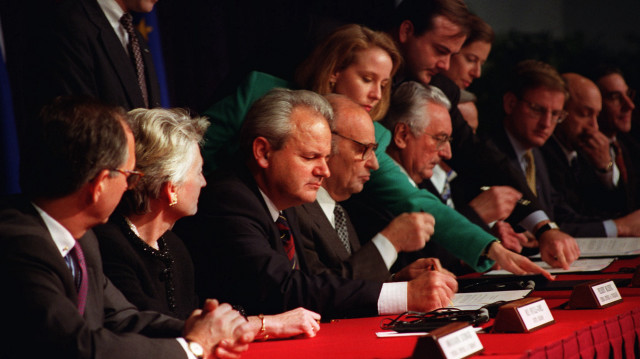

File photo
Balkan country still facing political crisis, with growing calls for reform
This week marks the 29th anniversary of the Dayton Peace Agreement, which ended nearly four years of devastating war in Bosnia and Herzegovina, establishing one of the world's most complex political systems.
Signed on Dec. 14, 1995, the agreement officially brought an end to the Bosnian War, in which at least 100,000 people were killed and over 2 million displaced.
- Aftermath: A Divided Nation
The agreement created a political system that split the country into two main entities: the Bosniak-Croat Federation of Bosnia and Herzegovina (FBiH) and the Serb-majority Republic of Srpska (RS).
Additionally, Brcko District was established as a special autonomous region. The deal recognized Bosniaks, Croats and Serbs as "constituent peoples" and set up a multi-layered political structure with multiple presidents, prime ministers and ministers.
While the aim was to prevent further conflict, this framework has faced criticism over time for stalling decision-making and effective governance.
- Persistent Debate
Despite ending the war, the Dayton Agreement remains a point of contention among Bosnian politicians.
They argue that while the agreement ended the war, it has become an obstacle to progress and stability.
"The Dayton Agreement is not a just peace, but it is more just than the continuation of the war," said Alija Izetbegovic, the first democratically elected president of independent Bosnia and Herzegovina, highlighting the difficult balance of peace in a divided society.
RS President Milorad Dodik has long advocated for the separation of his entity from Bosnia and Herzegovina, arguing that it would be in the best interests of the region.
Bosniak politicians, however, reject this rhetoric, accusing Dodik of undermining the constitutional order established by Dayton.
- Complex Political Structure
Dayton's framework has led to challenges in governance. The Presidency of Bosnia and Herzegovina, consisting of three members representing Bosniaks, Croats and Serbs, holds significant power but often struggles to reach a consensus.
Any substantial legislation, including key policies such as foreign affairs, requires unanimous agreement from these three representatives.
The complexity of the system, with over 130 ministers across cantonal, entity and state levels, has led to inefficiency and power struggles.
- Calls for Reform
As Bosnia and Herzegovina marks the 29th anniversary of the peace agreement, politicians and experts are increasingly calling for the reform or updating of the Dayton framework.
Some argue that it has failed to evolve with the country's changing needs, leading to a sense that it has reached an "expired expiration date."
With political deadlock becoming a familiar feature of governance, many view the Dayton Agreement as the root cause of the country's inability to implement meaningful reforms.
Despite the challenges, the Dayton Peace Agreement remains a cornerstone of Bosnia's post-war recovery, and its legacy is a testament to the complexities of peacebuilding in a fractured society.
*Writing by Gizem Nisa Cebi in Istanbul
#29th anniversary of the Dayton Peace Agreement
#Aliya Izetbegovic
#Bosnia and Herzegovina
#Bosniaks
#Bosnian War
#Croats
#Dayton Peace Agreement
#Milorad Dodik
#Serbs
